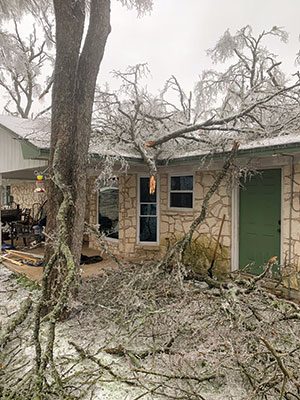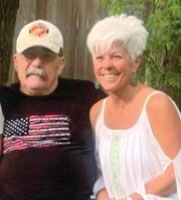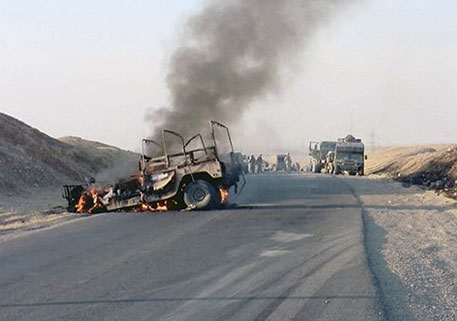
causing home damage from frozen debris.
Joni and Michael Stevenson had lived in their Texas home for just six months when a wave of heavy snow and ice covered the state, taxing energy grids beyond capacity and creating a deadly power shortage that left millions without electricity or heat for days.
According to the Texas Department of State Health Services, at least 125 people died in a series of intense, abnormal and dangerous winter weather events that rocked the Lone Star State in mid-February. Temperatures plunged into single digits, wreaking havoc on homes, and the snowstorm left many of the roads impassable.
For Joni and Michael, a disabled Marine Corps veteran, going several days without electricity tested their mettle and forced tough decisions.
“We’re pretty strong—we’re a strong unit,” said Joni, who works full time as Michael’s caregiver. “But of course, being our first few months in the house, we were thinking, ‘Oh my gosh, how are we going to get through this?’”
Their home in Belton—a central Texas city between Waco and Austin—lost power at 2 a.m. Joni started a fire right away, but by the following morning, it was clear they were in a losing battle against frigid conditions. As hail and sleet fell from the gray sky, she knew she had to make a move.
No power meant their food was spoiling, and with temperatures dipping below 40 degrees inside the house, Joni made the call to join her brother-in-law, who had already taken in a family with four children, across town.

Joni had heard of DAV, and its Disaster Relief Program, from another local veteran.
“People impacted by disasters are often faced with overwhelming loss,” said National Service Director Jim Marszalek. “DAV remains steadfast by fulfilling our promises to the men and women who served during isolated events or large-scale disasters like the one in Texas.”
DAV has provided relief in the event of natural disasters, like wildfires, hurricanes, earthquakes and tornadoes, but also following specific, isolated incidents, such as flooding or electrical fires.
In 2020, DAV provided more than $900,000 in disaster relief funds to veterans and their families, bringing the total amount dispersed to victims to $16 million since the program began in 1968. Since this past January, DAV has provided $374,500 in disaster relief grants, with an overwhelming majority directed to aid those affected by the Texas winter storms.
“Obviously, the numbers speak for themselves,” added Marszalek.
“There are areas in Austin and Killeen where people were without power for upwards of a week,” said Ryan Burgos, who supervises the Waco DAV office. “Some places lost water for about a week as well.”
Unexpectedly losing hundreds of dollars’ worth of fresh and frozen food due to spoilage, as the Stevensons did, was common for Texans affected by the storm—making the DAV grants an important way to keep families fed.
“A lot of the impact we’ve had on the veterans here was just being able to put food on the table,” Burgos added.
Joni said the application process was seamless and that it only required a phone call to a DAV benefits advocate. She was roaming the aisles of a local dollar store for limited supplies when Jennifer Kellogg, a DAV benefits advocate from the Waco office, called notifying Joni she’d be receiving some much-needed cash assistance.
“I was reduced to tears in the store,” recalled Joni. “I’m not usually on the receiving end of anything like this.”
Joni and Michael used the funds from DAV to replenish their food supply after catching word of a restocked store nearby.
Burgos added that disasters of any sort can have a dangerously adverse effect on veterans’ service-connected ailments, making DAV’s disaster relief efforts more vital than ever.
“Take a veteran who has PTSD, anxiety or depression,” he said. “Veterans’ anxiety can go through the roof when there’s, understandably, a panic, but they should know, help can be just a phone call away.”





